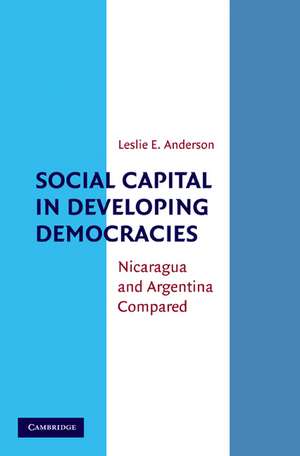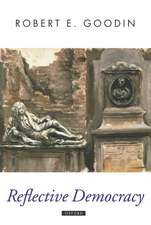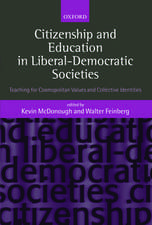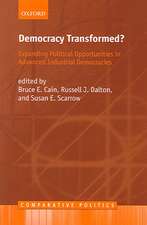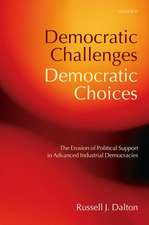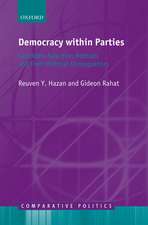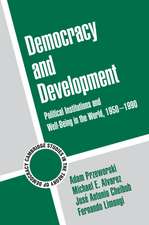Social Capital in Developing Democracies: Nicaragua and Argentina Compared
Autor Leslie E. Andersonen Limba Engleză Paperback – 7 mar 2010
| Toate formatele și edițiile | Preț | Express |
|---|---|---|
| Paperback (1) | 281.59 lei 6-8 săpt. | |
| Cambridge University Press – 7 mar 2010 | 281.59 lei 6-8 săpt. | |
| Hardback (1) | 466.65 lei 6-8 săpt. | |
| Cambridge University Press – 7 mar 2010 | 466.65 lei 6-8 săpt. |
Preț: 281.59 lei
Nou
Puncte Express: 422
Preț estimativ în valută:
53.88€ • 58.77$ • 45.43£
53.88€ • 58.77$ • 45.43£
Carte tipărită la comandă
Livrare economică 24 aprilie-08 mai
Preluare comenzi: 021 569.72.76
Specificații
ISBN-13: 9780521140843
ISBN-10: 0521140846
Pagini: 334
Ilustrații: 27 b/w illus. 8 tables
Dimensiuni: 155 x 235 x 17 mm
Greutate: 0.45 kg
Editura: Cambridge University Press
Colecția Cambridge University Press
Locul publicării:New York, United States
ISBN-10: 0521140846
Pagini: 334
Ilustrații: 27 b/w illus. 8 tables
Dimensiuni: 155 x 235 x 17 mm
Greutate: 0.45 kg
Editura: Cambridge University Press
Colecția Cambridge University Press
Locul publicării:New York, United States
Cuprins
1. Introduction; Part I. Creating Social Capital: People I Have Known: The Human Face of Popular Politics: 2. Creating 'we': Sandinismo and bridging social capital; 3. Creating 'us' and 'them': Peronism and bonding social capital; Part II. An Empirical Examination of the Argument: 4. A tale of two neighborhoods: social capital in Nicaragua and Argentina; 5. Political capital in Nicaragua and Argentina: political activism and political values; 6. Political capital in Nicaragua and Argentina: democratic institutions and procedures; Part III. Making Democracy Work Without Social Capital: Institutional Capital: 7. If you build it they will come; 8. Conclusion.
Recenzii
“This book provides a masterful analysis of political development in the cases of Argentina and Nicaragua. The analysis links citizen participation and institutional development in a novel way that shows how mass movements can establish enduring patterns of relationships between citizens and the state. The writing demonstrates the great depth of Leslie E. Anderson’s knowledge of the two countries and the strength of her command of the political and historical literature on them.”
– Lisa Baldez, Dartmouth College
“An unconventional comparison . . . chock-full of surprising and original arguments about the origins and varieties of social capital and the lasting legacies of nineteenth-century state-making.”
– Nancy Bermeo, Nuffield College, University of Oxford
“In this excellent book, Leslie Anderson provides an engaging account – and offers a compelling explanation – of the differences in the history, character, and quality of political development in Nicaragua and Argentina. The analysis is both straightforward and clear and at the same time rich and complex. The juxtaposition of the familiar concept of social capital with that of ‘institutional’ capital as alternative underpinnings for democratization in the two countries is particularly insightful and provocative. The extensive and careful research, which includes several types of empirical evidence, and the accompanying interpretation Anderson offers makes the book a particularly intriguing intellectual statement. It should appeal to a wide range of readers, within and beyond political science, interested in the social and structural factors that shape democracy in various contexts.”
– Rodney E. Hero, University of Notre Dame
“Anderson’s careful comparative politics of Argentina and Nicaragua avoids facile answers. Do economic development and social capital foster democracy? Not necessarily, as the reader discovers in these theoretically sharp, empirically girded – but artful – case studies.”
– Michael S. Lewis-Beck, University of Iowa
“Anderson examines political attitudes and political behavior in Nicaragua and Argentina from the 1990s through 2007 via archival research, interviews, and public opinion surveys. Anderson’s empirical analyses mix municipal surveys in Bello Horizonts, Nicaragua, and La Matanza, Argentina, with national surveys conducted as part of the Latinobarometer series. Recommended.”
– C.H. Blake, James Madison University, Choice
– Lisa Baldez, Dartmouth College
“An unconventional comparison . . . chock-full of surprising and original arguments about the origins and varieties of social capital and the lasting legacies of nineteenth-century state-making.”
– Nancy Bermeo, Nuffield College, University of Oxford
“In this excellent book, Leslie Anderson provides an engaging account – and offers a compelling explanation – of the differences in the history, character, and quality of political development in Nicaragua and Argentina. The analysis is both straightforward and clear and at the same time rich and complex. The juxtaposition of the familiar concept of social capital with that of ‘institutional’ capital as alternative underpinnings for democratization in the two countries is particularly insightful and provocative. The extensive and careful research, which includes several types of empirical evidence, and the accompanying interpretation Anderson offers makes the book a particularly intriguing intellectual statement. It should appeal to a wide range of readers, within and beyond political science, interested in the social and structural factors that shape democracy in various contexts.”
– Rodney E. Hero, University of Notre Dame
“Anderson’s careful comparative politics of Argentina and Nicaragua avoids facile answers. Do economic development and social capital foster democracy? Not necessarily, as the reader discovers in these theoretically sharp, empirically girded – but artful – case studies.”
– Michael S. Lewis-Beck, University of Iowa
“Anderson examines political attitudes and political behavior in Nicaragua and Argentina from the 1990s through 2007 via archival research, interviews, and public opinion surveys. Anderson’s empirical analyses mix municipal surveys in Bello Horizonts, Nicaragua, and La Matanza, Argentina, with national surveys conducted as part of the Latinobarometer series. Recommended.”
– C.H. Blake, James Madison University, Choice
Notă biografică
Descriere
Explores the contribution of social capital to the process of democratization and the limits of that contribution.
